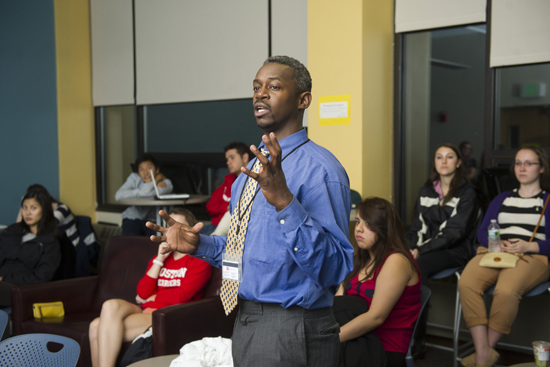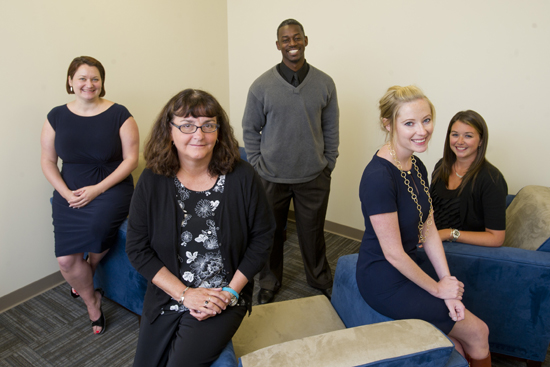Choosing to Do Something
Bystander training reaches hundreds of student leaders, athletes

Antonio Arrendel, SARP’s health and prevention educator, leads a recent bystander training session for resident assistants. Photos by Cydney Scott
Life is often defined by one’s actions, but for Antonio Arrendel it was a moment of inaction that changed the course of his life. He was at a club in 2002 when he witnessed a couple’s escalating argument. Arrendel didn’t intervene, didn’t call the cops, and didn’t think about the incident again until he saw on the news that the woman had been seriously injured.
“Ever since then, I’ve chosen to do something,” said Arrendel during a recent evening bystander training session. The one-time world-class sprinter who has worked for the past 15 years in violence prevention within college and university athletic departments, Boston schools, and national athletic camps joined BU this fall as the health and prevention educator at the newly opened Sexual Assault Response & Prevention (SARP) Center.
Arrendel shared his story with a couple of dozen resident assistants crowded into a Rich Hall recreation room for the two-hour training session. They were among more than 1,700 student leaders, resident assistants, and athletes SARP and staff at the Dean of Students office have trained to safely intervene when they recognize the warning signs of excessive alcohol use or predatory behavior.
Last spring, President Robert A. Brown made such training mandatory for all officers of student organizations receiving funding from the Student Allocations Board following the semester’s two alleged sexual assaults by BU men’s ice hockey players, alleged hazing incidents, and reports of shower peeping in residence halls.
During the session, Arrendel’s energy level never flagged, despite the late hour. He paced the packed room, encouraging reticent students to share their own bystander stories. After a long pause, Heather Coirin (CGS’13) said she once helped a girl walk home after she had been deserted by friends at a party. Another student, wearing a BU hockey jacket, confessed that he chooses not to intervene in confrontational situations after a friend got stabbed trying to stop an argument. And Emily Talley (SED’15) related that she once stood between a man harassing women at a bus stop and later called the police to have him arrested.

Choosing whether or not to intervene often depends on the situation, Arrendel said, referring to a PowerPoint presentation projected on the wall behind him. People often help when asked or when they see others take action, but they can choose not to if they feel unfit to help or can hesitate based on others’ inaction. It’s also safer to help when in a group and the situation is happening at a distance and least safe when the opposite is true, Arrendel pointed out.
He then clicked to the next screen. “All of a sudden, I just hit you with this,” he told the assembled RAs with an air punch. “Bam!” The words Sexual Violence Statistics appeared in white at the top of the slide. “In the United States,” Arrendel read, “1 in 6 women and 1 in 33 men reported experiencing an attempted or completed rape at some time in their lives.
“On college campuses,” he continued, “1 in 4 college women experience rape or attempted rape.” Women know their rapists 90 percent of the time. And less than 5 percent of them report the incident to authorities, he noted.
Arrendel paused to let students absorb the sobering statistics. As the father of three daughters, he told the group, “I have to do this. It’s not because I’m working here. I have to do this for my little girls. We all have something invested in this.”
So, why, he wanted to know, is the reporting of sexual assaults on campus so low? “There’s a lot of stigma attached to rape,” said Carina Traub (SED’16). “Victims blame themselves and are less likely to come forward, especially if they know the person.”
Arrendel said he thinks the statistics also reflect how society teaches “boys to be boys.” Men grow up hearing, “No don’t really mean no!” They’re told not to give up like that or to learn how to break her. Calling out friends, roommates, or teammates who talk that way can be difficult, Arrendel acknowledged.
A junior said many of his athlete friends make getting girls drunk their weekend MO. “By the end of the night, that’s what their goal is.” He wasn’t sure he’d have the courage to confront his friends about it. “Guys have too much pride,” he added. “They don’t want to be heard saying that. Others will ask, ‘What? You gay?’”
“That’s real,” Arrendel said, thanking him for sharing his observation before moving on to ways those conversations could be had in a less threatening manner. Then he brought up the issue of consent—when to ask for it and what it means in different contexts. He asked students to raise their right hand if they agreed and their left hand if they disagreed with the following statement: “It’s OK for two adults to engage in a sexual act after a night of drinking.” A sea of right hands went up, interspersed with a couple of raised left hands.
Andrew Cho (CAS’16) said he thought that unless the two were in a relationship, it was a bad idea. Talley said it depended on the people’s state of mind and if they drank responsibly. But Nora Philbin (CAS’15) countered that you can’t always tell how drunk someone is. Plus, “it’s not my business,” she said. “But it is your business,” Talley responded.
The heated conversation was clearly Arrendel’s Dead Poet’s Society moment. He pumped his fist and practically jumped off the ground. “That’s why I love this joint,” he yelled. He said he wants to hear more of these kinds of discussions around campus and hopes more students begin to consider themselves leaders in changing a culture of sexual violence wherever they encounter it.
The two-hour training wrapped up shortly afterward, but not before a party crasher entered the room. Thomas Fu (CAS’15) wanted to know when they would be done so he could watch the Celtics game on the room’s big-screen TV. He hadn’t received an invitation to the training, and didn’t realize that he needed one. So Arrendel, consummate entertainer that he is, rolled Fu into the discussion. After all, he had promised himself long ago that he wouldn’t turn his back on anyone—he would do something.
Those interested in attending a bystander training session can contact the Sexual Assault Response & Prevention Center, 930 Commonwealth Ave., at 617-353-SARP (7277) or via email at sarp@bu.edu.
Comments & Discussion
Boston University moderates comments to facilitate an informed, substantive, civil conversation. Abusive, profane, self-promotional, misleading, incoherent or off-topic comments will be rejected. Moderators are staffed during regular business hours (EST) and can only accept comments written in English. Statistics or facts must include a citation or a link to the citation.